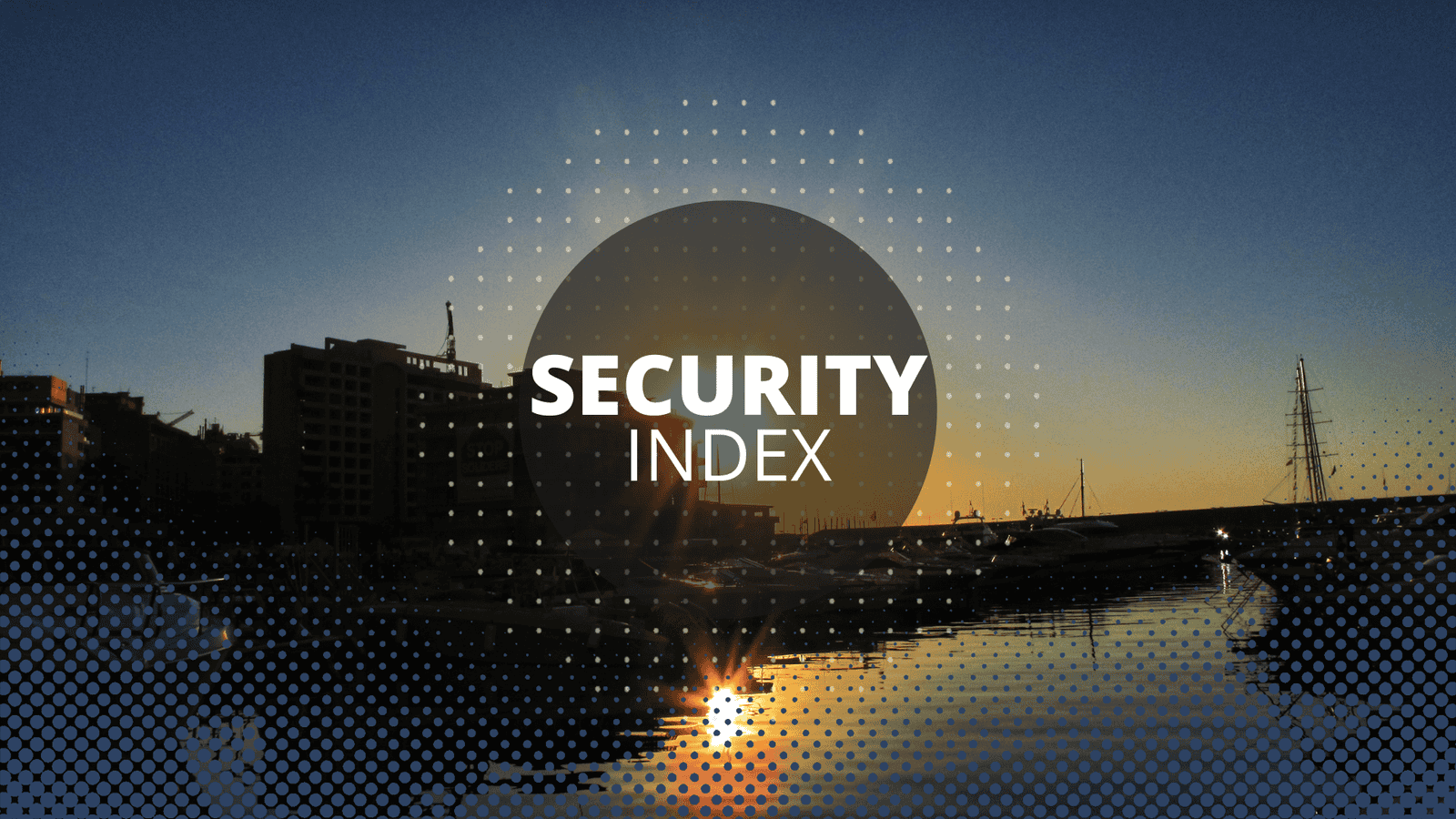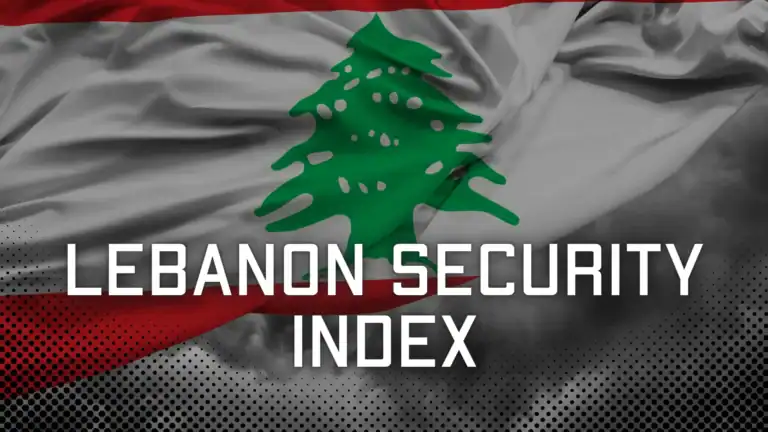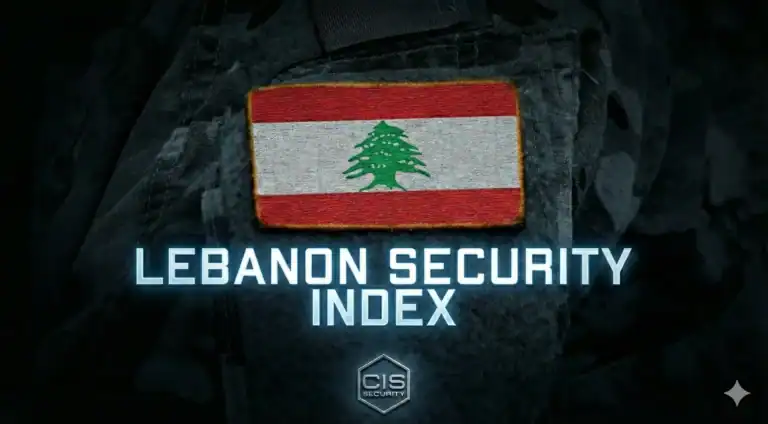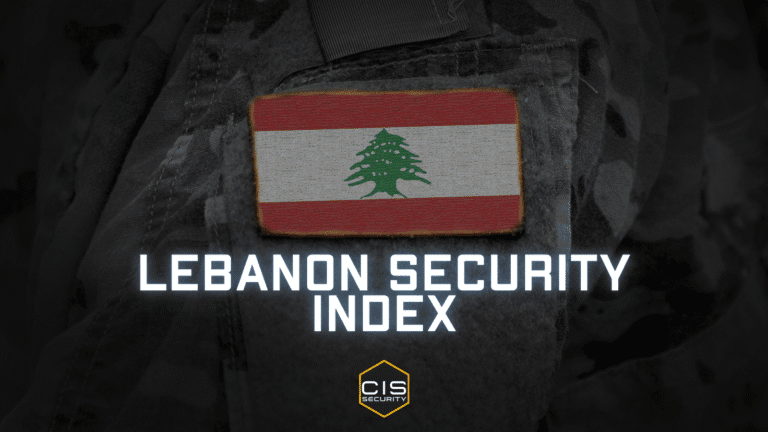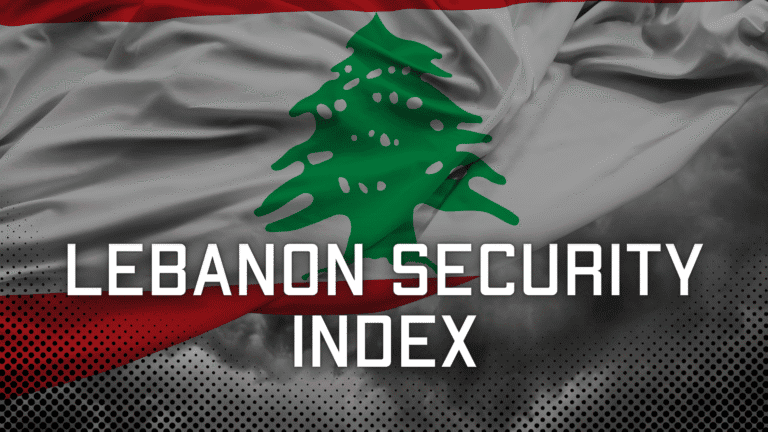CIS LEBANON SECURITY INDEX Sept 14 2025
🇱🇧 CIS LEBANON SECURITY INDEX Sept 14 2025
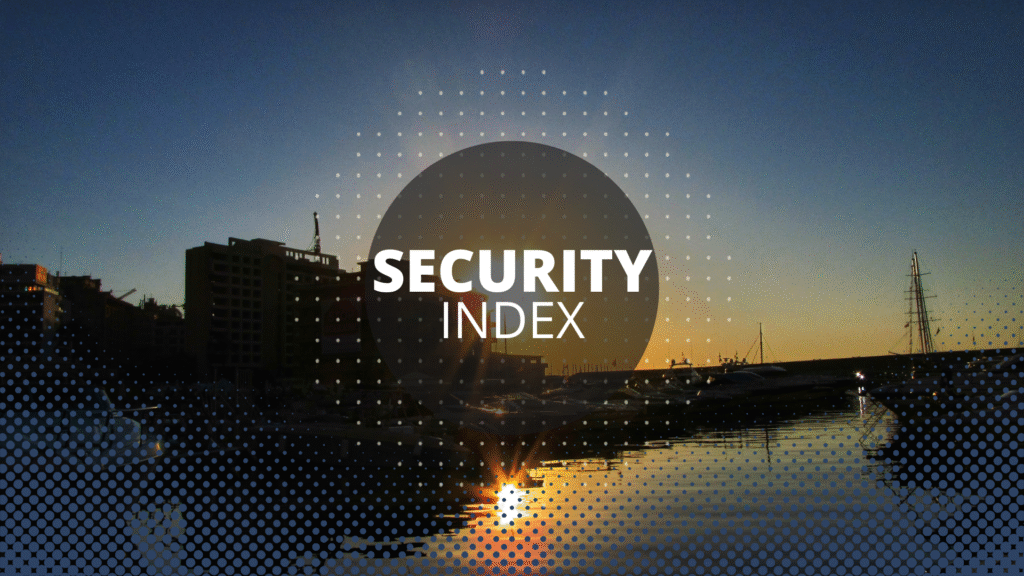
📊 TODAY’S LEBANON SECURITY INDEX READING
INDEX LEVEL: 🔴 CRITICAL
TODAY’S OVERALL INDEX: 92/100
TREND ANALYSIS: ⚠️ HIGH ALERT – STABILIZING FOLLOWING
RECENT ESCALATIONS
🌡️ COMPREHENSIVE GOVERNORATE-BY-GOVERNORATE SECURITY ASSESSMENT
BEIRUT 🏙️
Index Reading: 88/100 🔴
Status: Critical with Diplomatic Tensions. The capital remains under heightened security following significant diplomatic developments. The U.S. Department of Defense announced a $14.2 million Presidential Drawdown Authority security assistance package for Lebanon on September 11, 2025, indicating continued American concerns about Lebanon’s stability. Anger erupted after US special envoy Tom Barack made controversial remarks to reporters, further straining already fragile diplomatic relations between Lebanon and the United States.
The electricity crisis continues to paralyze daily life across the capital. The government provides electricity for only one to three hours a day on average, while people who can afford it supplement that supply with private generators. This infrastructure collapse affects all aspects of life from banking systems to hospital operations, creating a cascading effect of vulnerabilities. Banking services remain intermittent as ATMs frequently fail during power outages, forcing the population to rely heavily on cash transactions.
Security concerns persist around government buildings and diplomatic missions following the recent tensions with the U.S. envoy. The Lebanese army has increased patrols in central Beirut, particularly around the presidential palace and parliament building. Traffic congestion has worsened significantly due to non-functioning traffic lights during extended blackout periods, creating additional security vulnerabilities and emergency response delays.
Key Factor: U.S. security assistance package indicates ongoing instability concerns while infrastructure collapse creates cascading security vulnerabilities.
MOUNT LEBANON 🏞️
Index Reading: 85/100 🔴
Status: Critical with Infrastructure Strain. The mountainous governorate experiences severe spillover effects from the national electricity crisis. Businesses throughout the region struggle with operational continuity as the unreliable power supply forces expensive reliance on private generators. The tourism sector, traditionally vital to the region’s economy, faces unprecedented challenges as hotels and restaurants cannot guarantee consistent service quality.
Civil unrest potential remains elevated as the population grows increasingly frustrated with deteriorating living conditions. Small-scale protests have been reported in several townships, with residents demanding basic services. The lack of reliable electricity affects water pumping stations, creating secondary shortages that compound public anger.
The governorate’s proximity to Beirut means it experiences significant overflow of security concerns from the capital. Lebanese Armed Forces (LAF) resources are stretched thin across the region, with units reporting equipment failures due to lack of maintenance funding and fuel shortages affecting patrol operations.
Key Factor: Infrastructure collapse creating economic hardship and potential for civil unrest while security resources remain overstretched.
NORTH LEBANON 🌊
Index Reading: 87/100 🔴
Status: Critical with Resource Scarcity. Tripoli and surrounding areas face acute security challenges compounded by severe economic distress. The region’s dependence on the port for economic activity makes it particularly vulnerable to infrastructure failures. The electricity crisis has effectively shut down many small businesses, increasing unemployment and social tensions.
Security incidents involving armed groups occasionally disrupt daily life, with the LAF reporting increased weapons smuggling activities from Syria. The limited government presence in remote areas of the governorate creates security vacuums that various militant groups attempt to exploit. Cross-border smuggling operations have intensified as economic desperation drives illegal activities.
Water shortages have become critical, with several municipalities reporting that pumping stations cannot operate effectively with only 1-3 hours of daily power. This creates humanitarian concerns and increases the likelihood of social unrest as basic needs remain unmet.
Key Factor: Economic collapse driving security concerns while limited state presence creates exploitable vulnerabilities.
AKKAR 🌲
Index Reading: 89/100 🔴
Status: Critical with Border Security Challenges. The Syrian border situation presents ongoing complications for Lebanese security forces. Syrian forces recently arrested a Hezbollah cell operating across the border, highlighting the complex cross-border dynamics and coordination challenges between Lebanese and Syrian authorities.
The LAF struggles with insufficient resources to effectively monitor Lebanon’s extensive border with Syria. Equipment failures are common due to lack of maintenance funds, and many border posts operate with minimal staffing. The electricity crisis has rendered electronic monitoring systems largely ineffective, forcing reliance on manual surveillance methods.
Cross-border smuggling activities continue unabated, with reports of weapons, drugs, and other contraband moving freely across poorly monitored sections of the border. The economic crisis drives local populations to participate in or ignore smuggling operations as alternative income sources become scarce.
Key Factor: Resource-constrained border security operations creating vulnerabilities for cross-border militant and criminal activities.
BEQAA VALLEY 🍇
Index Reading: 91/100 🔴
Status: Critical with Active Security Operations. The valley remains a focal point for regional security concerns due to its strategic importance and ongoing tensions. Lebanon says Hezbollah will be disarmed south of Litani within three months, indicating ongoing government efforts to implement disarmament plans, though enforcement capabilities remain questionable.
The agricultural sector, vital to the region’s economy, faces severe disruption from the electricity crisis. Irrigation systems fail regularly during power outages, threatening crop yields and farmer livelihoods. This economic pressure increases social tensions and creates conditions conducive to recruitment by various armed groups.
Israeli surveillance activities continue over the region, with regular overflights reported by local authorities. The civilian population expresses increasing anxiety about potential escalation, particularly given the region’s history as a conflict zone. Emergency services remain compromised due to fuel shortages and equipment failures.
Key Factor: Government disarmament efforts face implementation challenges while agricultural crisis creates economic and social pressures.
BAALBEK-HERMEL 🕌
Index Reading: 94/100 🔴
Status: Critical – High Risk Zone. This region remains one of Lebanon’s most volatile areas due to its strategic significance and complex security dynamics. As a traditional Hezbollah stronghold, the area faces ongoing tensions related to national disarmament efforts and regional security concerns.
Infrastructure collapse is complete, with virtually no state-provided electricity affecting all aspects of daily life. Hospitals operate on limited generator power, while schools frequently close due to inability to maintain basic services. The economic impact is severe, with most businesses unable to operate profitably under current conditions.
Security incidents are reported regularly, though specific details often remain classified by authorities. The region’s isolation and difficult terrain make it challenging for security forces to maintain effective control. Local populations increasingly rely on non-state actors for basic services and security, creating parallel governance structures.
Key Factor: Complete infrastructure failure combined with complex security dynamics and limited state presence creating conditions for parallel governance.
KESERWAN-JBEIL 🏛️
Index Reading: 76/100 🟡
Status: Elevated with Economic Pressures. The coastal governorate maintains relative stability compared to other regions but faces significant economic challenges. The tourism sector, historically crucial to the local economy, has experienced dramatic decline due to regional instability and infrastructure failures.
Hotels and restaurants struggle to maintain operations with unreliable electricity, leading to reduced service quality and tourist satisfaction. Many establishments have invested heavily in generator systems, significantly increasing operational costs and reducing profitability. Some businesses have temporarily closed pending improvement in conditions.
The governorate’s relative security allows it to serve as a refuge for displaced populations from more volatile regions, creating additional strain on local resources and services. While this influx provides some economic benefit, it also increases competition for scarce resources and housing.
Key Factor: Tourism-dependent economy severely impacted by infrastructure failures and regional instability, though relative security provides some stability.
SOUTH LEBANON 🌴
Index Reading: 96/100 🔴
Status: Critical – Active Monitoring Required. The southern governorate remains one of Lebanon’s most dangerous regions following recent escalations. On September 3, 2025, Israel Defense Forces (IDF) drones dropped four grenades close to UNIFIL peacekeepers working to clear roadblocks near the Blue Line. This was described as “one of the most serious attacks on UNIFIL personnel and assets since the cessation of hostilities”.
The UN Security Council voted to extend the UN peacekeeping mission in southern Lebanon, known as UNIFIL, until the end of 2026 and then to begin an “orderly and safe drawdown and withdrawal” over the course of 2027. This planned withdrawal creates significant uncertainty about future security arrangements and has heightened tensions among all parties.
The Lebanese Armed Forces has expanded its deployment in the south, dismantled Hezbollah fortifications, and begun consolidating weapons under state control. However, implementation faces significant challenges due to resource constraints and local resistance. The civilian population remains caught between competing authorities and security forces.
The electricity crisis has rendered many security systems non-functional, creating additional vulnerabilities. Border monitoring equipment frequently fails, and communication systems remain unreliable. This degraded infrastructure makes effective security coordination extremely challenging.
Key Factor: Recent attacks on UN peacekeepers combined with planned UNIFIL withdrawal creating security vacuum concerns while disarmament efforts face implementation challenges.
NABATIEH ⛪
Index Reading: 94/100 🔴
Status: Critical – Ongoing Tensions. The governorate continues to experience security incidents and significant infrastructure challenges. As part of the broader southern Lebanon security concerns, the region faces ongoing tensions related to disarmament efforts and regional military activities.
The civilian population experiences daily challenges from infrastructure collapse, with hospitals, schools, and essential services operating on minimal power. Water distribution systems fail regularly during blackout periods, creating humanitarian concerns for vulnerable populations including elderly residents and children.
Economic activity has ground to a halt in many areas, with small businesses unable to operate profitably under current conditions. Agricultural activities, traditionally important to the region, face severe disruption from irrigation system failures and inability to process or transport goods effectively.
Key Factor: Infrastructure collapse creating humanitarian concerns while ongoing security tensions maintain elevated threat levels.
🎯 COMPREHENSIVE SECURITY INTELLIGENCE BRIEF
🔥 IMMEDIATE HIGH-RISK AREAS REQUIRING CONSTANT MONITORING:
Priority Level 1 – Critical:
- South Lebanon Border Zone – Following the September 3, 2025 drone attack on UNIFIL peacekeepers, all border areas remain extremely dangerous. Israeli drones dropping grenades near peacekeepers represents one of the most serious attacks on UNIFIL personnel since cessation of hostilities.
- Baalbek-Hermel Region – Complete infrastructure collapse combined with complex security dynamics makes this area unpredictable. Limited state presence allows non-state actors to operate with minimal interference.
- All UNIFIL Positions – With the UN Security Council voting to wind down the UNIFIL mission after 2026, peacekeeping positions face increased vulnerability as withdrawal planning begins.
Priority Level 2 – High Risk: 4. Major Urban Centers During Peak Hours – Electricity crisis creates vulnerability windows when traffic systems fail and emergency response capabilities are compromised.
- Syrian Border Crossings – Recent arrests of cross-border militant cells indicate ongoing security challenges requiring enhanced monitoring.
- Government Buildings and Diplomatic Missions – Following tensions with U.S. envoy Tom Barack, diplomatic locations face elevated threat levels.
✅ RELATIVELY LOWER-RISK ZONES (MAINTAIN EXTREME CAUTION):
Conditional Stability Areas:
- Coastal Jbeil and Batroun – Tourist areas maintain better security presence but face economic pressures that could trigger instability.
- Central Mount Lebanon Residential Areas – Away from major conflict zones but vulnerable to spillover effects and infrastructure failures.
- Northern Metn Districts – Reduced direct security incidents but significant infrastructure challenges affect daily operations.
Important Caveat: Even “lower-risk” zones face critical infrastructure challenges that create secondary security vulnerabilities. No area of Lebanon can be considered truly safe under current conditions.
⚠️ AREAS TO AVOID COMPLETELY TODAY:
Absolute No-Go Zones:
- DO NOT TRAVEL TO LEBANON – International travel warnings remain at highest levels
- All areas within 10km of Israeli border (Blue Line)
- Baalbek-Hermel region due to ongoing security operations
- Any UNIFIL positions or checkpoints following recent attacks
- Active protest sites and political gatherings
- Areas near critical infrastructure during peak failure periods
📱 COMPREHENSIVE PROFESSIONAL SECURITY GUIDANCE
🏠 CRITICAL GUIDANCE FOR RESIDENTS:
Immediate Survival Priorities: The convergence of infrastructure collapse and security tensions creates unprecedented challenges for residents. With government electricity provision limited to only one to three hours daily, normal life has become a constant survival exercise.
Power and Communications:
- Invest immediately in solar panel systems with battery backup – generators are expensive to fuel and maintain
- Maintain multiple fully charged power banks and backup batteries for essential communications
- Establish communication protocols with family/neighbors for emergency coordination
- Keep battery-powered radios for emergency information when internet/cellular networks fail
Water and Food Security:
- Store minimum 3-week water supply as pumping stations fail during blackouts
- Install water storage tanks with gravity-fed distribution systems
- Maintain non-perishable food supplies that don’t require refrigeration
- Establish relationships with local suppliers for priority access during shortages
Medical Preparedness:
- Stock essential medications with extended supplies due to hospital power limitations
- Identify backup medical facilities with reliable generator systems
- Maintain first aid supplies and basic medical equipment
- Plan alternative routes to medical facilities as traffic systems frequently fail
Financial Security:
- Maintain substantial cash reserves as ATMs fail during power outages
- Diversify currency holdings (USD, EUR) due to Lebanese pound instability
- Establish multiple banking relationships to access funds during system failures
- Consider precious metals for long-term value preservation
🏢 ESSENTIAL BUSINESS CONTINUITY MEASURES:
Operational Resilience: Current conditions require fundamental changes to business operations. The Lebanese government approved a U.S. plan to disarm Hezbollah, but implementation creates additional uncertainty for business planning.
Power Independence:
- Transition to independent power systems immediately – grid power unreliable
- Secure long-term fuel supply contracts for generator operations
- Implement energy-efficient operations to reduce power requirements
- Consider relocating critical operations to areas with better power infrastructure
Supply Chain Security:
- Diversify supply routes to avoid single points of failure
- Maintain larger inventory buffers due to transportation uncertainties
- Establish relationships with multiple suppliers across different regions
- Plan for extended delivery delays and transportation security measures
Human Resources Management:
- Implement flexible work arrangements to accommodate infrastructure failures
- Provide transportation assistance during fuel shortages
- Establish emergency communication procedures for staff safety
- Consider temporary relocation of essential personnel to safer areas
Financial Management:
- Maintain higher cash reserves for operational continuity
- Diversify banking relationships across multiple institutions
- Plan for electronic payment system failures
- Consider barter arrangements with suppliers and customers
🚗 CRITICAL TRAVELER ADVISORY:
ABSOLUTE TRAVEL PROHIBITION: DO NOT TRAVEL TO LEBANON UNDER ANY CIRCUMSTANCES
Current conditions make travel to Lebanon extremely dangerous for several critical reasons:
Active Security Threats:
- Recent attacks on international peacekeepers demonstrate escalating violence
- IDF drone attacks on UNIFIL represent serious escalation in targeting international personnel
- Disarmament efforts create unpredictable security dynamics across the country
Infrastructure Collapse:
- Complete electricity grid failure affects all essential services
- Transportation systems unreliable due to fuel shortages and traffic system failures
- Emergency response capabilities severely compromised
- Hospital and medical facilities operating on minimal power
Communication Failures:
- Internet and cellular networks frequently disrupted during power outages
- Emergency services response times extremely extended
- International communication systems unreliable
For Essential Personnel Already in Country:
- Maintain constant communication with security personnel
- Avoid all non-essential movement
- Register with embassies and maintain evacuation readiness
- Coordinate movements with security forces
🔮 DETAILED 24-HOUR SECURITY FORECAST
Predicted Index Reading: 91/100
Forecast Trend: ⚠️ CAUTIOUS STABILIZATION WITH VOLATILITY RISK
Immediate Risk Factors (Next 24 Hours):
High Probability Events:
- Infrastructure Failures – Continued electricity outages affecting 90%+ of daily operations
- Traffic System Breakdowns – Non-functioning traffic lights creating congestion and accident risks
- Emergency Response Delays – Limited fuel and power affecting ambulance and fire services
- Banking System Intermittencies – ATM networks failing during peak blackout periods
Medium Probability Events:
- Diplomatic Tensions – Potential fallout from recent U.S. envoy controversies
- Civilian Protests – Frustration over electricity crisis may trigger demonstrations
- Border Security Incidents – Ongoing smuggling and cross-border activities
- UNIFIL Operational Adjustments – Changes in peacekeeping posture following recent attacks
Lower Probability High-Impact Events:
- Major Infrastructure Attack – Targeting of remaining functional power or water systems
- Escalation in Disarmament Tensions – Resistance to government disarmament efforts
- Regional Military Activity – Israeli operations affecting Lebanese territory
- Complete Banking System Failure – Extended power outages causing financial system collapse
Preparation Recommendations:
- Expect continued infrastructure challenges affecting all daily activities
- Maintain heightened security awareness around international facilities
- Plan for extended emergency response times
- Prepare for potential civil unrest related to deteriorating conditions
📊 COMPREHENSIVE WEEKLY AND MONTHLY SECURITY ANALYSIS
This Week’s Average Index: 92/100
Change from Last Week: -1 point (Slight improvement following diplomatic engagement)
Monthly Trend: Cautious Stabilization
Quarterly Assessment: Critical Transition Period
Seasonal Analysis – Lebanon at a Crossroads:
Lebanon currently faces its most complex security environment since the end of the civil war. The UN Security Council’s decision to extend UNIFIL until 2026 followed by withdrawal in 2027 creates a critical transition period that will determine the country’s long-term stability.
Positive Developments:
- U.S. security assistance package of $14.2 million indicates continued international support
- Lebanese Armed Forces expanding deployment and dismantling Hezbollah fortifications shows government assertiveness
- No major military escalation in the past week despite ongoing tensions
Critical Challenges:
- Electricity provision limited to 1-3 hours daily creating humanitarian crisis
- September 3 attack on UNIFIL peacekeepers represents dangerous escalation
- Infrastructure collapse affecting all sectors of society and economy
Long-term Trajectory: The next six months will be crucial for Lebanon’s future. The combination of international pressure for disarmament, planned UNIFIL withdrawal, and complete infrastructure collapse creates conditions that could lead either to stabilization under stronger state control or further fragmentation. The government’s ability to implement disarmament while rebuilding basic services will determine which path the country takes.
Economic Security Implications: The electricity crisis serves as a multiplier for all other security challenges. Without reliable power, the economy cannot function, emergency services remain compromised, and social tensions continue to escalate. Any security strategy must prioritize infrastructure restoration as a foundation for broader stability.
🛡️ CIS SECURITY: LEBANON’S PREMIER COMPREHENSIVE SECURITY SOLUTIONS
Since 1990, CIS Security has protected Lebanon’s most critical assets through every major crisis. Today, as the nation faces simultaneous infrastructure collapse, security transitions, and regional tensions, our three decades of experience provide unmatched protection capabilities.
CRISIS-SPECIFIC SECURITY SERVICES:
Infrastructure Independence Package:
- Power Security Systems: Independent solar installations with military-grade battery backup, ensuring 24/7 operational capability regardless of grid failures
- Communication Networks: Satellite-based communication systems providing reliable contact capabilities when cellular and internet networks fail
- Water Security Solutions: Independent water storage, purification, and distribution systems protecting against municipal supply failures
- Fuel Management Services: Secure fuel procurement, storage, and distribution for critical operations
Advanced Threat Protection:
- Intelligence Networks: Real-time threat assessment using human intelligence sources across all Lebanese governorates
- Secure Transportation: Armored vehicle services with trained security drivers familiar with current road conditions and security checkpoints
- Executive Protection: Personal security details trained in current threat environments and emergency medical response
- Facility Security: Comprehensive protection for residential and commercial properties including intrusion detection systems operating on independent power
Crisis Response and Evacuation:
- Emergency Coordination: Direct liaison with international forces, Lebanese security services, and diplomatic missions
- Medical Emergency Response: Trained medical personnel with emergency transportation capabilities to functioning medical facilities
- Evacuation Services: Pre-planned extraction routes and coordination with international transportation networks
- Family Security Planning: Comprehensive protection strategies for families including children and elderly members
Business Continuity Assurance:
- Operational Continuity: Complete business continuity planning including alternative operational locations
- Supply Chain Security: Protected procurement and distribution networks for essential business supplies
- Financial Security: Secure banking alternatives and cash management during system failures
- Employee Protection: Comprehensive personnel security including transportation and emergency response
SPECIALIZED SERVICES FOR CURRENT CONDITIONS:
UNIFIL Transition Management: With peacekeeping forces preparing for withdrawal, CIS Security provides:
- Independent security assessments replacing UNIFIL monitoring capabilities
- Coordination with Lebanese Armed Forces for seamless security transitions
- Intelligence sharing with international partners to maintain regional security awareness
Disarmament Period Security: During the ongoing disarmament process:
- Enhanced personal protection during periods of uncertainty
- Secure facility protection against potential retaliation or criminal activity
- Emergency response planning for rapid situation changes
Infrastructure Failure Mitigation: Addressing Lebanon’s collapsed infrastructure:
- Complete off-grid security system operations
- Emergency response capabilities independent of municipal services
- Long-term security planning for extended infrastructure recovery periods
🚨 IMMEDIATE EMERGENCY RESPONSE CAPABILITIES
24/7 Crisis Response Center: Our operations center maintains constant monitoring and immediate response capabilities despite national infrastructure failures. Staffed by experienced security professionals with direct access to:
- Real-time intelligence from across Lebanon
- Emergency response teams positioned in all major regions
- Direct communication channels with international security partners
- Medical response teams with advanced life support capabilities
Rapid Deployment Teams:
- Armed security teams available for immediate deployment
- Emergency medical response with evacuation capabilities
- Technical teams for security system installation and repair
- Intelligence officers for threat assessment and mitigation
CONTACT INFORMATION – PRIORITY RESPONSE PROTOCOLS
Crisis Hotline (24/7): +961-3-539900
- Direct access to emergency response coordinators
- Immediate deployment authorization for critical situations
- Real-time security consultation and threat assessment
Secure Digital Communications:
- Website: www.cissecurity.net (secure portal access available)
- Encrypted Messaging: Available upon client enrollment
Regional Operations Centers:
- Beirut Central: Full-service operations despite infrastructure challenges
- Mount Lebanon: Specialized residential and commercial security
- North Lebanon: Border security and transportation services
- South Lebanon: High-risk area operations with international coordination
- Beqaa Valley: Agricultural and industrial security specialization
International Coordination:
- Direct liaison with embassy security offices
- Coordination with international business security requirements
- Evacuation planning with international transportation networks
When infrastructure fails and institutions falter, CIS Security provides the stability and protection Lebanon’s most discerning clients demand. Our commitment remains constant—your security is our mission.
CRITICAL OPERATIONAL NOTICE: This assessment reflects rapidly evolving conditions as of September 14, 2025, 18:00 local time. The security situation remains highly fluid with infrastructure collapse as the primary destabilizing factor affecting all other security considerations. Recent attacks on international peacekeepers and ongoing disarmament efforts create additional volatility requiring constant monitoring and professional security consultation.
Update Frequency: This index is updated every 12 hours during current crisis conditions. Emergency updates issued immediately upon significant developments. Professional security consultation strongly recommended for all residents, businesses, and any international personnel operating in Lebanon.
Verification Standards: All security assessments based on verified intelligence sources, official government communications, international organization reports, and direct field observations from CIS Security personnel operating throughout Lebanon. Information accuracy verified through multiple independent sources before publication.

